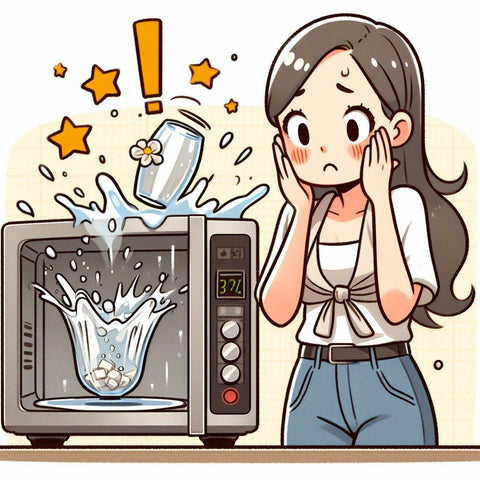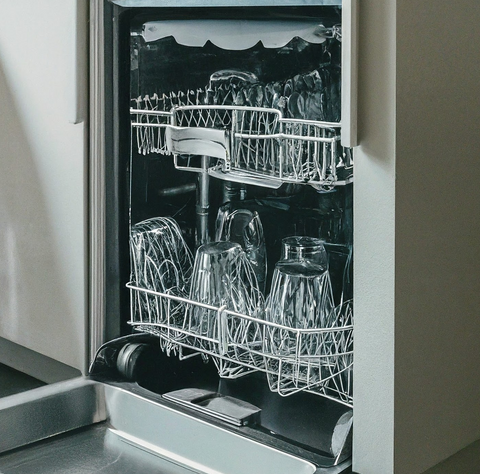The Ultimate Guide to Glass Cups: Safe, Sustainable, and Sensational - Everything You Need to Know
In the realm of drinkware, glass cups have always been beloved for their timeless elegance and practicality. Whether it's for casual gatherings or formal occasions, glass cups hold a special place. Apart from their aesthetic appeal, glass cups offer a range of functionalities that make them an essential item in many households. However, concerns about the safety of glass cups in microwaves and dishwashers, as well as common issues like glass cup explosions, often capture people's attention.
In this blog, we will uncover the secrets of glass cups, exploring their safety and versatility in microwaves and dishwashers, as well as providing valuable insights and tips on proper cleaning to ensure their longevity and safe handling.
In today's fast-paced world, the convenience of a microwave has become a necessity for many households. However, when it comes to using glass cups in the microwave, safety concerns often arise: Can glass cups withstand high temperatures? Are they microwave-safe?

Firstly, it's important to understand the composition of glass cups to determine their safety for microwave use. Glass cups are typically made from a mixture of silica, soda ash, and lime, heated and molded into various shapes. Glass is a non-reactive material, meaning it does not release harmful chemicals or toxins when exposed to heat or microwaves. This makes glass a generally safe choice for microwave use. However, a few factors need to be considered before heating glass cups in the microwave. Ensure that the glass cups you use are specifically labeled as heat-resistant or microwave-safe, as these cups are designed to withstand the rapid temperature changes that occur in microwaves.
Furthermore, before heating in the microwave, check the glass cup for any cracks, chips, or other damage. Damaged glass cups may break or shatter when heated. Avoid using glass cups with metallic decorations or embellishments for microwave heating, as they may generate sparks and damage the microwave. If you need to cover the glass cup while microwaving, use microwave-safe lids or covers specifically designed for microwave use to prevent splatters and retain heat.
Additionally, glass cups do not take well to sudden and extreme temperature changes, so avoid transferring them directly from the refrigerator to the microwave, or allowing them to cool gradually after microwaving, to avoid abrupt temperature shifts. When removing the glass cup from the microwave, use oven mitts or a towel to protect your hands, as the cup will become hot during the microwaving process.
Unveiling the truth about glass cup dishwasher safety: Are glass cups safe to wash in a dishwasher?

Most glass cups can indeed be placed in the dishwasher for cleaning, catering to our busy lifestyles. However, several factors can affect the safety of glass cups in dishwashers. The quality and thickness of the glass are crucial for dishwasher safety. Thinner or more fragile glass cups may not withstand the impact and vibrations in the dishwasher, leading to breakage or shattering. Additionally, if the glass cup has special decorations, patterns, or metallic components, it is best to hand wash them as these embellishments may be sensitive to high temperatures, abrasive detergents, and strong water pressure, which could cause damage.
For most ordinary glass cups, placing them in the top rack of the dishwasher rather than the bottom reduces the risk of collision and breakage. Avoid direct contact between glass cups and other hard objects, such as metal utensils, to prevent friction and impact. Furthermore, follow the dishwasher's instructions, select appropriate washing cycles and temperatures to ensure gentle and effective cleaning.
When cleaning glass cups, a few additional considerations are important. Firstly, avoid using excessively hot water or strong acidic or alkaline cleaning agents, as these may cause damage to the glass cups. Use mild detergents and a soft sponge or brush to gently wipe the surface of the glass cups. If stubborn stains are present, you can use lemon juice, baking soda, or white vinegar for cleaning. Note that certain glass cups, such as crystal glasses, have specific cleaning requirements and may need special care and cleaning methods.
Finally, instances of glass cup explosions are extremely rare under normal circumstances. Glass cup explosions typically occur in the presence of obvious defects or damage, sudden temperature changes, the use of inappropriate materials, or under extreme conditions (e.g., heating non-heat-resistant glass cups at high temperatures). By following the aforementioned safety recommendations and selecting well-made, tested glass cups, you can minimize the risks associated with such issues.
In conclusion, glass cups can generally be safely used in microwaves and dishwashers, but certain factors need to be considered. Choose heat-resistant glass cups, avoid using damaged or glass cups with metallic decorations, and follow proper heating and cleaning guidelines to ensure the safety and durability of glass cups.
Disclaimer: For specific safety advice regarding the use of specific glass cups in microwaves or dishwashers, be sure to consult the manufacturer's specific instructions and guidelines.
Editor’s Picks
- From $3.90
- From $3.90
- Unit price
- / per
- From $4.50
- From $4.50
- Unit price
- / per
- From $4.90
- From $4.90
- Unit price
- / per
- $5.90
$8.90- $5.90
- Unit price
- / per
- From $5.90
- From $5.90
- Unit price
- / per
- $6.90
$9.90- $6.90
- Unit price
- / per
- From $9.90
- From $9.90
- Unit price
- / per
- $9.90
$14.90- $9.90
- Unit price
- / per
- $10.90
$14.90- $10.90
- Unit price
- / per
- $10.90
$16.90- $10.90
- Unit price
- / per
- From $11.90
- From $11.90
- Unit price
- / per
- $11.90
$16.90- $11.90
- Unit price
- / per
- $11.90
$17.90- $11.90
- Unit price
- / per
- $13.90
$17.90- $13.90
- Unit price
- / per
-
transparent handle
-
pink handle
- $13.90
$17.90- $13.90
- Unit price
- / per
- $14.90
$19.90- $14.90
- Unit price
- / per
- $15.80
$21.80- $15.80
- Unit price
- / per
- $15.90
$21.90- $15.90
- Unit price
- / per
- $23.90
$29.90- $23.90
- Unit price
- / per
-
Colorful
-
Transparent
- $27.90
$35.90- $27.90
- Unit price
- / per




































